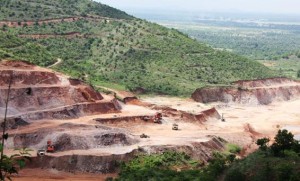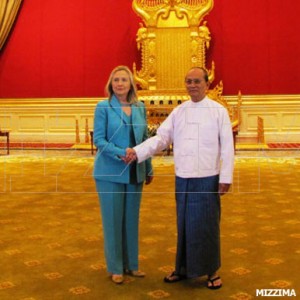Posts Tagged ‘Investment’ (49 found)
The Foreign Investment Law (2012)
The full text of the Foreign Investment Law in English and Burmese.
• •U.S. State Department Must Hold U.S. Companies in Burma to International Standards
New investors in Burma should be required to publicly report on their human rights and environmental impacts, land acquisitions, security arrangements, and government payments – as well as those of their subsidiaries and business partners […]
• • •Land Grabbing in Dawei (Myanmar/Burma): An (Inter)National Human Rights Concern
Land grabbing is an urgent concern for people in Tanintharyi Division, and ultimately one of national and international concern, as tens of thousands of people are being displaced for the Dawei Special Economic Zone (SEZ). Dawei lies within Myanmar’s (Burma) southernmost region, the Tanintharyi Division, which borders Mon State to the North, and Thailand to the East, on territory that connects the Malay Peninsula with mainland Asia […]
• • •Mining, Repression and Imprisonment, an Uncertain Future
 Burma has been internationally praised for moving in a more democratic direction recently. Sadly for many citizens these changes are a world away. Their interactions with the Burma government are characterized by the same repressive, corrupt, strong armed tactics that made Burma an international pariah for decades.
Burma has been internationally praised for moving in a more democratic direction recently. Sadly for many citizens these changes are a world away. Their interactions with the Burma government are characterized by the same repressive, corrupt, strong armed tactics that made Burma an international pariah for decades.
In the Letpadaung mountains, huge amounts of land have been forcibly confiscated by the government, environmental degradation has occurred and a policy of arrest and detention of peaceful protestors has been implemented. The Monywa Copper Project is located in central Burma’s Sagaing Division with four large deposits: Sabetaung, Sabetaung South, Kyisintaung and Letpadaung. The project covers almost 8,000 acres of land, the majority of which was forcibly taken from villagers.
Resource extraction has been the cause of some of Burma’s largest human rights violations and land confiscations. The Monywa Copper Project is the country’s largest mine in terms of recovery rates, production and revenue. Protests over the project and national attention have been growing, as have the number of arrests and detentions in association with those protests and land confiscation cases.
• • •Rights Groups Express Strong Concern About Weak Requirements for U.S. Investment in Burma
After submitting a detailed comment to the U.S. Department of State expressing concern over weak reporting requirements for U.S. companies considering investing in Burma, EarthRights International, Freedom House, Physicians for Human Rights, U.S. Campaign for Burma and United to End Genocide issued the following statement […]
• • •Too Much Too Soon: US Lifting of Sanctions Risks Perpetuation of Human Rights Violations
 On June 14, Daw Aung San Suu Kyi, speaking at the annual ILO conference in Geneva, warned the international community against dealing with the Myanma Oil and Gas Enterprise (MOGE), “The Myanma Oil and Gas Enterprise … with which all foreign participation in the energy sector takes place through joint venture arrangements, lacks both transparency and accountability at present.”
On June 14, Daw Aung San Suu Kyi, speaking at the annual ILO conference in Geneva, warned the international community against dealing with the Myanma Oil and Gas Enterprise (MOGE), “The Myanma Oil and Gas Enterprise … with which all foreign participation in the energy sector takes place through joint venture arrangements, lacks both transparency and accountability at present.”
Despite this warning, on July 11, the US issued an executive order allowing American companies to invest in Burma’s oil and gas sector, and specifically with MOGE, “Today, the United States is easing restrictions to allow U.S. companies to responsibly do business in Burma.”
Daw Aung San Suu Kyi’s concerns with MOGE stem from the fact that it is a military controlled, state enterprise that has long been associated with some of the gravest human rights abuses documented in Burma, predominantly in ethnic nationality areas where the country’s natural resources are concentrated […]
US Decision to Ease Myanmar Sanctions Must be Coupled with Assistance in Developing Legislation and Rigorous Assessment of Investments
The ASEAN Inter-Parliamentary Myanmar Caucus (AIPMC) today urged caution for investors seeking to do business in Myanmar and called on the United States, ASEAN, the World Bank, the International Monetary Fund and other international bodies to assist Myanmar in developing rigorous business and investment laws that will help to ensure investments into Myanmar meet international ethical standards and do not fuel further human rights abuses or undermine the fragile reform process […]
• • •Burma: US Backtracks on ‘Responsible Investment’ Pledge
Business Reporting Requirements Won’t Deter Abuses, Corruption
The new United States government policy allowing business activity in Burma’s controversial oil sector with reporting requirements will not adequately prevent new investments from fueling abuses and undermining reform, Human Rights Watch said today.
The Obama administration announced that it will waive longstanding US sanctions on investment and financial services in Burma […]
• • •Breaking: US Government Eases Sanctions on Burma
ERI concerned about risks for human rights, environment
ERI is greatly concerned by today’s announcement that the U.S. will issue General Licenses authorizing U.S. companies to do business in Burma without abiding by international best practices on human rights, environmental performance, and financial transparency. The construction of foreign-owned oil and gas pipelines continues to contribute to conflict and human rights abuses in ethnic minority areas such as Shan State, and companies investing in infrastructure development cause community suffering through forced displacement and environmental destruction throughout Burma […]
• • •Rights Groups Express “Grave Concern” Regarding U.S. Policy on Investment in Burma
In response to Secretary of State Hillary Clinton’s announcement on the lifting of restrictions on U.S. investment in Burma, five human rights groups issued the following statement:
“We express grave concern regarding the U.S. government’s decision to allow investments into businesses connected to the Burmese regime that are corrupt and help to fuel human rights violations. As it stands now, investment in many of the most attractive sectors of the Burmese economy is likely to worsen the human rights situation while directly benefitting individuals and entities responsible for rights abuses, who contribute to corruption, or are otherwise acting to obstruct political reform […]
• • •








 All posts
All posts